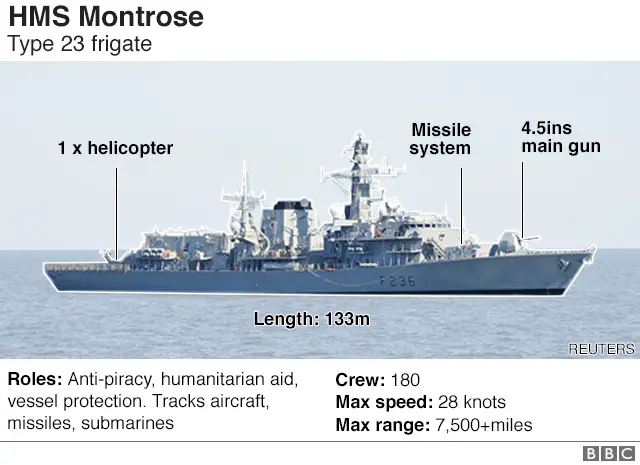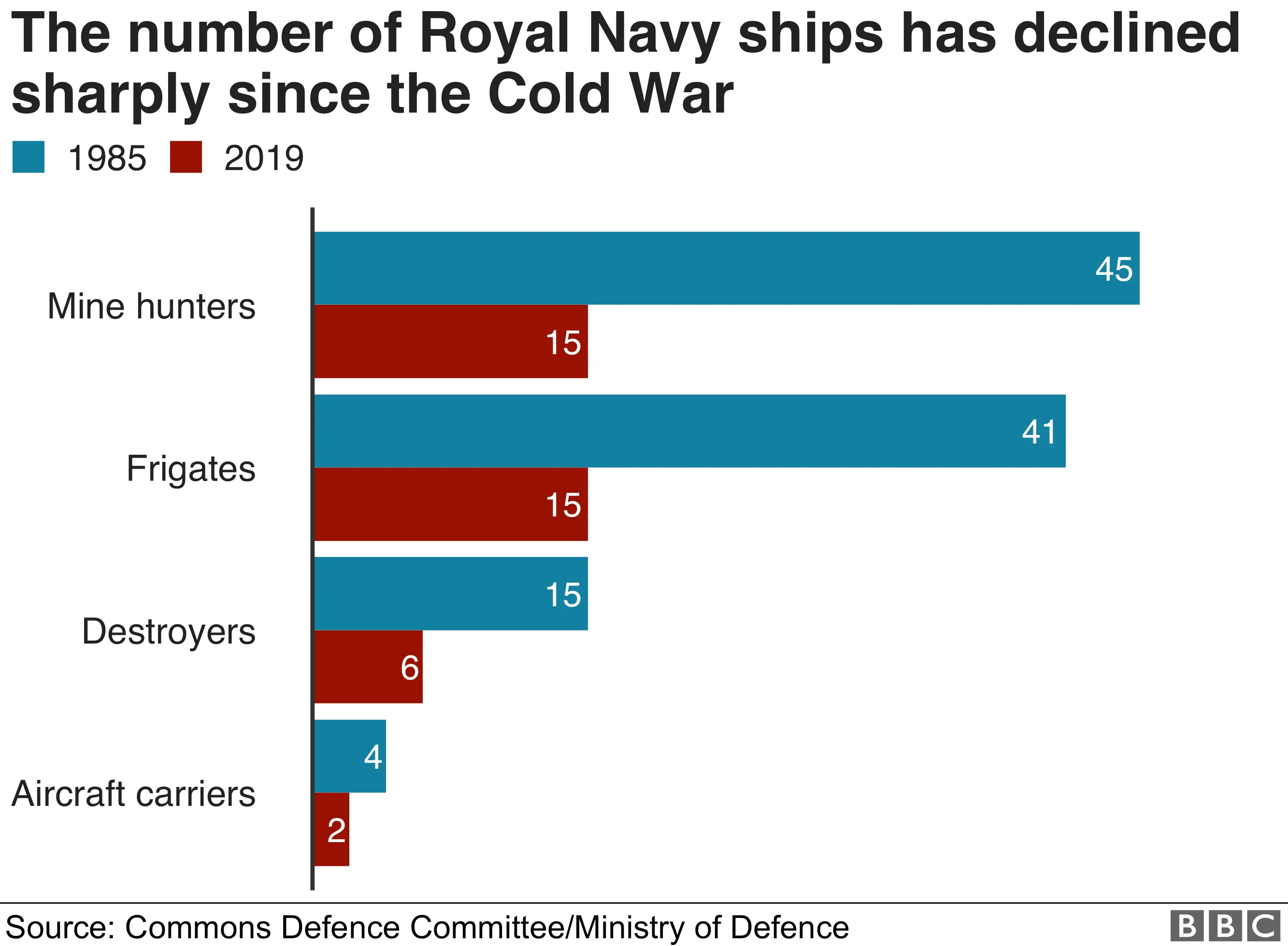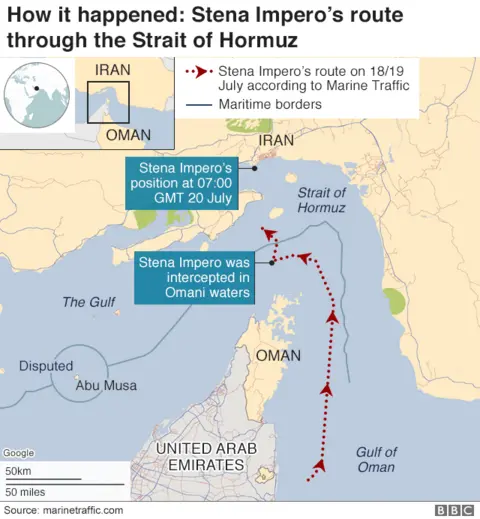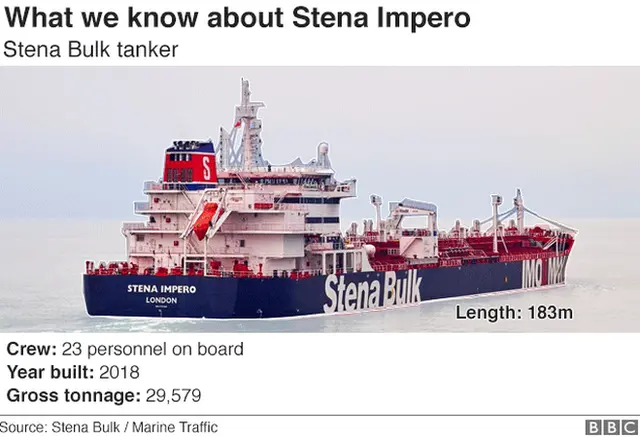Iran tanker seizure: May chairs Cobra meeting on crisis
Downing Street has repeated its calls for Iran to immediately release a British-flagged tanker that was seized in the Gulf on Friday.
Prime Minister Theresa May has been chairing the government's emergency committee Cobra to receive updates and discuss security in the area.
Her official spokesman described the seizure of the ship as "unacceptable and highly escalatory".
The foreign secretary is expected to set out next steps to MPs later.
It comes amid reports ministers are considering freezing Iranian assets.
On Sunday, ministers denied domestic politics meant the government had taken its "eye off the ball".
The detainment of the Stena Impero marks escalating tensions between the UK and Iran, coming weeks after Britain helped seize a tanker carrying Iranian oil.
What happened?
On Friday, the Stena Impero was seized by the Iranian Revolutionary Guard in the key shipping route of the Strait of Hormuz after Tehran said it was "violating international maritime rules".
Video released by Iran's Revolutionary Guard-affiliated Fars news agency appeared to show the moment the tanker was raided.
A recording emerged of radio exchanges between HMS Montrose and Iranian armed forces vessels moments before the tanker was seized.
Iranian vessel can be heard telling the British frigate it wants to inspect the Stena Impero for security reasons.
Iran's state-run IRNA news agency said the tanker was captured after it collided with a fishing boat and failed to respond to calls from the smaller craft.
Foreign Secretary Jeremy Hunt said it was illegally seized in Omani waters and forced to sail into Bandar Abbas port in Iran.
The seizure of the Stena Impero comes two weeks after Royal Marines helped seize Iranian tanker Grace 1 off Gibraltar, because of evidence it was carrying oil to Syria in breach of EU sanctions.
Mr Hunt said the Grace 1 was detained legally, but Iran said it was "piracy" and threatened to seize a British oil tanker in retaliation.
Could the Royal Navy have done more?
Former Cabinet minister Iain Duncan Smith told the BBC there were legitimate questions over the British government's actions, after HMS Montrose was too far away to stop the ship's seizure.
He said the detention of the Grace 1 tanker carrying Iranian oil two weeks earlier ought to have served as a warning British vessels in the Gulf needed protection.

The Tory MP said he understood the US had offered the UK "assets" to support its shipping and they were not taken up.
"This is a major failure and the government has to answer that charge very quickly indeed," he said.
Former commander of UK maritime forces Rear Admiral Alex Burton said the size of the Navy's fleet had limited the UK's ability to act.
"There is no doubt that the size of the Navy since 2005 - reduced from 31 frigates and destroyers to now 19 - has had an impact on our ability to protect our interests around the globe," he told BBC Radio 4's Today programme.

US Central Command said it was developing a multinational maritime effort in response to the situation.
Defence minister Tobias Ellwood said it was "impossible" to escort each individual vessel.
He said the situation required "international co-operation" and suggested more money should be invested in the Navy if Britain wanted to continue to play a role on the international stage.
What happened to the tanker and its crew?
The Stena Impero is still being held in the port of Bandar Abbas, in southern Iran.
The tanker's Swedish owner, Stena Bulk, has made a formal request to visit the 23 crew members, who are Indian, Russian, Latvian and Filipino.
They have all been taken off the ship for "questioning", Iran's Press TV reported.

A relative of one Indian crew member, who did not want to be identified, told the BBC on Sunday the family was concerned and had not received any messages from him since the vessel was detained.
But they said the family was being kept well informed by the Swedish company and felt reassured about diplomatic efforts to free the ship after meeting company officials on Sunday.
Although the crew and owners are not British, the Stena Impero carries the UK flag.
"Historically speaking it means that the UK owes protection to the vessel," explained Richard Meade, from maritime publication Lloyds List.
What has Iran said?
Iran's foreign minister Javad Zarif tweeted on Saturday that the UK "must cease being an accessory to #EconomicTerrorism of the US".
He said Iran guarantees the security of the Gulf and the Strait of Hormuz, and insisted its action was to "uphold international maritime rules".
Iran's ambassador to London has warned the UK against escalating tensions, tweeting: "This is quite dangerous and unwise at a sensitive time in the region."
What's the background to tensions in the Gulf?
Relations have been deteriorating between Iran and the UK and US.
In April, the US tightened sanctions it had re-imposed on Iran after withdrawing from a 2015 nuclear deal.
The US blamed Iran for attacks on tankers since May, which Tehran denies. On Friday, the US claimed to have destroyed an Iranian drone in the Gulf.
The UK government has remained committed to the deal, which curbs Iran's nuclear activities in return for the lifting of sanctions.
However, the UK's help in seizing the Iranian tanker Grace 1 infuriated Iran.
Last week, the UK said Iranian boats also attempted to impede a British oil tanker in the region before being warned off by HMS Montrose. Iran denied any attempted seizure.
International reaction
The White House said Friday's incident was the second time in more than a week the UK had been "the target of escalatory violence" by Iran.
On Sunday, the Foreign Office confirmed Mr Hunt spoke with his French and German counterparts, who have both condemned Iran's actions.
France's Jean-Yves Le Drian and Germany's Heiko Maas agreed that safe passage through the Strait of Hormuz is a top priority for European nations, while avoiding any possible escalation.



Diplomatic solution 'will be complicated'

A diplomatic solution to this crisis is going to be complicated, not least because Britain's relationships with its traditional partners - the US and the Europeans - are under strain.
Diplomatic pressure - action at the UN or tough economic sanctions - requires the building of a coalition.
France and Germany have given London rhetorical support. President Trump is standing beside his British ally.
But the US and the EU are fundamentally at loggerheads over the fate of the nuclear deal with Iran and what many European capitals see as a thinly disguised US policy that seeks regime change in Tehran.



